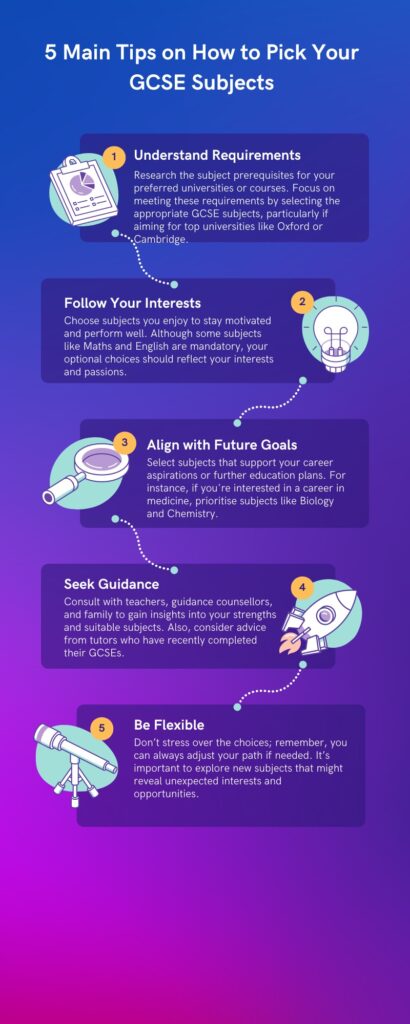Table of Contents:
Why are GCSE Exams Important?
GCSE exams are typically taken by students in Year 11, their last year of secondary school. However, there are no age restrictions to take GCSEs and technically, everyone older than 16 can take them. There are three core subjects – GCSE English, GCSE Maths and GCSE Science.
GCSE exams are important because they give students an opportunity to demonstrate their knowledge and prove that they have worked hard at school. They are also a stepping stone to the next stage of education and can determine your success in life, as many jobs require candidates to have a pass in GCSE English and GCSE Maths, at least.
Succeeding in your GCSE exams can determine the future of your education and career. Nevertheless, do not be worried. Even if you don’t do well, your life isn’t over! You can resit an exam or take a foundation year at the university. Read more here on what to do if you fail your GCSEs.
How Many GCSEs Should I Do?
There’s no one-size-fits-all answer to the question of how many GCSEs you should take. The average student takes 9, but there’s no maximum number of GCSEs you can do. It is recommended to take no more than 16.
It is important to note that the more GCSEs you take, the harder it will be for you to keep up to date with your revision, as you’ll be juggling many subjects at once. This may also leave less time for your other commitments and hobbies, which are important to maintaining good mental health. It can be easy to obsess about the number, but the important thing is that you’re doing the right amount of GCSEs for YOU and that you won’t overwork yourself by choosing too many.
It’s better to do fewer subjects than average and get good grades in all of them rather than choosing too many subjects and not having enough time to prepare for all of them.
What Factors Should I Consider When Choosing My GCSE Subjects?
Choosing your GCSE subjects can be a daunting task, as the subjects you choose can have a significant impact on your future education and career prospects. It’s important to take the time to carefully consider your options and make informed decisions. While there are no hard and fast rules for choosing GCSE subjects, here are five tips to help you make the best decision for you. These tips are not meant to be rigid rules, but rather recommendations to help you navigate the process of choosing. Whether you’re just starting to think about your GCSE options or you’re in the process of finalising your choices, these tips can help you make the best decision for you.
5 Main Tips on How to Pick Your GCSE Subjects
🔎 Look at the Requirements of Sixth Forms and Universities
Some sixth forms or universities may have minimum subject requirements for all students, while others may have specific requirements for certain programs or tracks. Make sure you are aware of any requirements and choose subjects that meet them. Additionally, if you are considering applying to prestigious universities such as Cambridge or Oxford, you should be aware that they often have specific subject requirements for admission.
It’s a good idea to research the subject requirements for your desired universities and choose subjects that will meet those requirements. You might consider a mix of challenging and easier GCSE subjects. It’s also a good idea to check with your teachers or guidance counsellor to get a sense of what subjects are most commonly required. This will help ensure that you are on track to meet any requirements and set yourself up for success.”
🔎 Choose Subjects You Enjoy
This isn’t always possible, considering all GCSE students have to do Maths and English GCSE and at least Single Science, but when it comes to making decisions about your GCSE choices, it’s important that you’re choosing subjects you like. Selecting subjects that you are interested in can help you stay motivated and engaged in your studies.
It’s also more likely that you will do well in subjects that you enjoy, as you will be more invested in learning the material. So, start by making a list of the subjects you enjoy the most and consider them while picking your subjects. It’s not uncommon to have to balance your interests with other factors, such as school requirements or future goals, but starting with your interests can help you narrow down your options and make the decision-making process a bit easier. Here you can see what are your GCSE subject options.
🔎 Consider Your Future Goals
While choosing your GCSE subjects, it’s important to think about what you want to do after you finish your GCSEs. Some careers and higher education programs may require or prefer certain subjects, so it’s a good idea to research what subjects may be beneficial for your desired path.
For example, if you want to study medicine, you may want to consider taking biology and chemistry as your GCSE subjects. However, if you really dislike biology, you may want to reconsider whether a career or education path in a biology-related field is right for you. It’s important to balance your long-term goals with your personal interests and strengths. If you’re not sure what you want to do after your GCSEs, it’s still a good idea to choose subjects that will keep your options open and give you a strong foundation for future study.
🔎 Ask for Advice About GCSE Subjects
There are plenty of people around willing to talk things through with you and give you their advice. Your teachers are a good place to start, as they know you and your strengths and weaknesses very well. Your parents or guardian may also have opinions and advice and will help you to talk things through and make informed decisions.
In addition to your teachers and parents, your guidance counsellor can be a valuable resource when it comes to choosing your subjects. They can help you assess your interests and goals and recommend subjects that may be a good fit for you. They can also provide information about subject requirements and expectations at universities.
Tutors who have recently passed their GCSEs can also be helpful resources. They may have firsthand experience with the subject selection process and can offer helpful advice on what to consider and how to navigate the decision-making process.
🔎 Don’t Stress About It
Choosing your GCSE subjects is an important decision, but it’s important to remember that it’s not set in stone. It’s important to consider your interests and future goals. However, don’t be afraid to step outside your comfort zone and try something new. You never know – you may discover a passion for a subject you never thought you’d enjoy. Even if you don’t end up loving the subject, you may learn valuable skills or knowledge. So, don’t be afraid to take a chance and try something new. It may end up being one of your favourite subjects.
Many students start a GCSE and decide it’s not for them, so if you have made the wrong decision, it’s not too late to change it. While GCSE exams are important, your health and happiness should always come first. Make sure that you aren’t putting yourself under unnecessary pressure and stress trying to choose the “perfect” subjects. It’s okay to make mistakes and to change your mind. What’s most important is that you choose subjects that you will enjoy and that will challenge you. With hard work and dedication, you can be successful in any subject you choose. 💪

What are Some Bad Reasons to Choose GCSE Subjects?
There are also some not-so-good reasons to choose subjects. These include:
❌ Pleasing your parents, guardian or teachers. Validation feels good, but it’s better to ensure a good future than to seek approval.
❌ Avoiding subjects with a reputation for being difficult. Or, choosing the subjects you know are “easy 9s”. You can check out this article about GCSEs to find some of the easiest/hardest subjects. Keep in mind that it’s often better to score a little lower on a subject that is considered “respected” or academically rigorous, rather than getting a high score on an easier subject. While it’s natural to want to do well on all of your GCSEs, it’s important to remember that it’s better to challenge yourself and learn valuable skills and knowledge, even if it means scoring a little lower.
❌ Choosing the same subjects as your friends. We know, it’s comforting to have your friends by your side. Nonetheless, it’s your future we are talking about!
Your GCSE exams are about you, and so you need to make the best possible decision to allow you to succeed. Although it’s fine to take advice from teachers, friends and parental figures, you should not let other people choose for you. Similarly, all GCSEs have more difficult aspects to them; there are no ‘easy GCSEs’. Choose according to your strengths, but don’t try to cut corners or find an easy way out. There is no way to avoid working hard if you want to succeed in your GCSEs.
How to Pass Your GCSEs?

So, you’ve finally chosen your GCSE subjects! Congratulations! Now, you’re probably wondering what to do next.
✅ Attend all your classes and pay attention. Attendance is crucial for success in your GCSEs. Make sure to attend all your classes and pay attention to what the teacher is saying.
✅ Take good notes. Taking notes can help you retain information and stay organised. Use a system that works for you, such as bullet points or diagrams, and review your notes regularly to reinforce your understanding of the material. You can use other revision methods as well. Experiment and find the one that works for you.
✅ Ask for help when you need it. Don’t be afraid to ask your teachers or classmates for help if you are struggling with a subject. They can provide additional resources and guidance to help you understand the material.
✅ Stay organised and manage your time effectively. Make a study schedule and stick to it. Set aside dedicated time for studying and prioritise your assignments and exams. (It is okay for things to not go as planned sometimes, don’t let it stop you)
✅ Review your material regularly. Reviewing your material regularly, rather than trying to cram it all in at the last minute, can help you retain information and perform better on exams.
✅ Get plenty of sleep. Make sure to get enough sleep to be well-rested and alert for your studies.
✅ Take breaks! Avoid the temptation to overwork yourself. It may seem cool to others, but burnout is not good for you at all. It’s better to take breaks and rest your mind so that you can come back to your studies feeling refreshed and ready to learn. Trust me – your mind will thank you.
Summary
We know it can be a stressful time, but remember that you’ve got this! Just stay focused and dedicated, and you’ll do great.
When it comes to choosing your GCSE subjects, it’s important to consider your interests, goals, and university requirements. Remember to seek out advice from your teachers and guidance counsellor, and don’t be afraid to try something new. Just make sure to avoid bad reasons for choosing subjects, like peer pressure or the desire to impress others.
Have a good study plan and everything will be swell!
If you’re feeling overwhelmed and unsure about how to approach your GCSEs, don’t worry. You’re not alone. It’s completely normal to feel a little overwhelmed from time to time, especially with the added pressure of school. If you’re struggling to manage on your own, it’s okay to seek out help and support. Something that can be extra helpful is to find someone who recently passed their GCSEs and gets your struggles. Edumentors’ GCSE tutors are from Cambridge, Oxford, Warwick and other top UK universities. They know what it takes and how to study effectively. Hence, they can help you achieve your desired grades the best!








